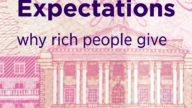Fundraising, Funding sources, Governance
What’s in a name? Why we called our book ‘Rich Expectations’
Beth Breeze explores the complex and often conflicting expectations that surround philanthropic giving by wealthy individuals, as revealed in her new book Rich Expectations: Why Rich People Give.
Coming up with the title for a new book is not as much fun as it might sound. The total length of most books is around 80,000 words, all agonised over, drafted and re-drafted in the months it takes to get a manuscript ready to be printed and launched into the world. In the midst of that work, inspiration needs to strike to come up with an eye-catching title (average length under 10 words) that does justice to the book’s content and makes sense in a blink of the eye to a potential book-buyer.
We don’t know if the title we chose – Rich Expectations: Why rich people give – succeeds on the latter criteria, though we’re grateful to hear of healthy sales in the first week since our book was launched on 1 September 2025, but we feel confident it does accurately reflect the main findings and arguments that lie within the covers. The standout theme in the data we collected for this third edition of the ‘Why Rich People Give’ research project was the extensive and diverse set of expectations held by, and about, rich people.
Here’s some quotes from our interviewees to give a flavour of what we mean:
“I think it’s expected that those who in one way or another have benefited a lot in life can give a bit back.”
“When we donate, we expect our money to be put to work. We don’t want to be wined and dined but we expect an email saying thank you and telling us what impact it had.”
“It’s unrealistic to expect philanthropists to make no mistakes – as long as we get most things right then we are were growing and achieving our goals.”
These quotes illustrate that rich donors have expectations of themselves to use some of their spare resources to help others – and they also hold that expectation of other rich people, leading some to lose respect for, and even friendships with, less generous peers. They also have expectations that their donations will be used well, that their generosity will be acknowledged, and that they will be updated by the charities they have supported so they can understand the difference that their gift has made. And they do not expect to be unfairly criticised when they have voluntarily tried to do their best to help address some of the knottiest problems that remain unsolved by either government or the market.
Expectations can occur elsewhere in the world of philanthropy too. This includes some politicians and policymakers expecting philanthropists to step in and fund work for which public funds cannot be found; philanthropists expecting the charities they support to provide unreasonable access and influence over the charity’s future direction; or fundraisers expecting a positive societal reaction to a major gift they have secured, and overlooking the potential for public discomfort with the donor’s source of wealth, or concerns about the donor’s character and conduct.
As all these examples indicate, the many different people, groups and organisations that help to shape the philanthropy ecosystem hold a wide range of expectations – some of which are explicit, whilst others remain implicit. When philanthropic activity does not function as smoothly as hoped, this is often because these expectations have not been made clear or met – leading to frustration, disappointment or even anger.
We do not suggest that such problems can ever be entirely removed, given the different (and sometimes opposing) points of view that are held by and about philanthropists. But we do believe that articulating expectations so that they are more clearly understood – even if not accepted – by all, could help to minimise the risks of misunderstanding and misalignment leading to the breakdown of philanthropic funding relationships.
We hope that this book will promote a better understanding of the expectations held by and about rich donors, and the expectations that they hold of other parties, and that this may result in smoother and more enjoyable interactions for all, as well as more effective impact in advancing the mission of charities supported by rich donors.

